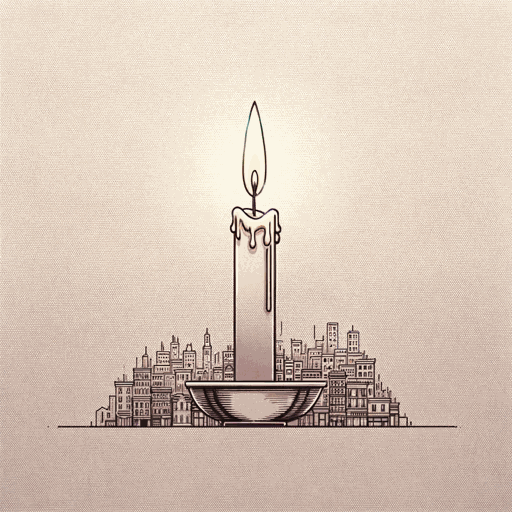24 pages • 48 minutes read
Mark TwainThe War Prayer
Fiction | Short Story | Adult | Published in 1905A modern alternative to SparkNotes and CliffsNotes, SuperSummary offers high-quality Study Guides with detailed chapter summaries and analysis of major themes, characters, and more.
Summary and Study Guide
Summary: “The War Prayer”
“The War Prayer” is a short story by Mark Twain. Written in 1905, the story remained unpublished in his lifetime, not appearing in print until 1916. Twain is widely regarded as one of America’s greatest writers and is best known for works like The Adventures of Tom Sawyer (1876) and Adventures of Huckleberry Finn (1885). Twain’s output was prolific and included novels, short stories, articles, essays, speeches, and criticism.
“The War Prayer” is primarily set in a church, where a minister prays for victory as a country prepares for war. A mysterious stranger arrives urging the congregation to consider the true meaning of their prayer. The story was likely written as a reaction to the Spanish-American and Philippine-American Wars, employing Twain’s hallmark satire to tackle themes of nationalism, religious hypocrisy, and war. This guide refers to the text of “The War Prayer” found in the Project Gutenberg edition of a collection of Twain’s writing called Europe and Elsewhere (1923).
The story opens in an unnamed country preparing to send soldiers to war. The mood is one of excitement and celebration, marked by bands, military parades, and fireworks. In this environment, few people acknowledge the consequences of war, and the handful who do are quickly dismissed. The narrator says, “the half dozen rash spirits that ventured to disapprove of the war […] got such a stern and angry warning that for their personal safety’s sake they quickly shrank out of sight and offended no more in that way” (Paragraph 1).
On Sunday morning, the day before troops ship out, a church is packed with soldiers who dream of action and glory. They dream of returning home as heroes. Their families and other community members, proud of the soldiers’ service and sacrifice, are also gathered there. The liturgy centers on war, with Old Testament verses about war being read and a recitation uttered in unison by the congregation calling upon God’s wrath. The minister asks God to “watch over our noble young soldiers, and aid, comfort, and encourage them in their patriotic work,” adding “help them to crush the foe, grant to them and to their flag and country imperishable honor and glory” (Paragraph 3).
As the minister prays, an “aged stranger” enters the church and makes his way to the front of the sanctuary (Paragraph 4). He stands next to the minister, who has his eyes closed while praying and does not realize the stranger is there. The prayer ends with the minister asking God, “Protector of our land and flag” (Paragraph 4), to grant the country victory. At that point, the minister opens his eyes and is surprised by the stranger standing beside him. The stranger motions for the minister to step aside, and the minister does, allowing the stranger to speak.
The stranger proclaims to the congregation, “I come from the Throne—bearing a message from Almighty God” (Paragraph 6). He explains that the minister’s prayer was really two prayers, “the spoken and the unspoken” (Paragraph 7), and the stranger’s job is to speak the unspoken parts. The stranger clarifies his point with the analogy, “If you pray for the blessing of rain upon your crop which needs it, by that act you are possibly praying for a curse upon some neighbor’s crop which may not need rain and can be injured by it” (Paragraph 7). In other words, by praying for victory for themselves, the church is also praying for injury to others.
The stranger proceeds to speak the unspoken part of the minister’s prayer. “O Lord our God, help us to tear their soldiers to bloody shreds with our shells” (Paragraph 9), the stranger says the church has prayed. The stranger continues, saying the church prayed for the destruction of their enemies’ homes and for their women and children to be left homeless, starving, and left wandering as refugees. According to the stranger, the church asked God to “blight their lives, protract their bitter pilgrimage, make heavy their steps, water their way with their tears, stain the white snow with the blood of their wounded feet” (Paragraph 9). He mockingly adds that they have prayed for these things “in the spirit of love” (Paragraph 9). As the stranger finishes, he asks the church if they still desire for God to hear their prayer. The story ends with the church not understanding the stranger’s message and dismissing him as “a lunatic” (Paragraph 11).
In the early years of the United States’ wars in Afghanistan and Iraq, Twain’s story received renewed attention due to its anti-war message. In 2006, the story was adapted into an animated short by journalist Markos Kounalakis. A 2007 live-action short film adaptation, starring actor Jeremy Sisto as the stranger, takes place on March 20, 2003, the day after the United States invaded Iraq.
Related Titles
By Mark Twain

A Connecticut Yankee in King Arthur's Court
Mark Twain

A True Story
Mark Twain

Letters from the Earth
Mark Twain

Life on the Mississippi
Mark Twain

Roughing It
Mark Twain

The Adventures of Huckleberry Finn
Mark Twain

The Adventures of Tom Sawyer
Mark Twain

The Autobiography of Mark Twain
Mark Twain

The Celebrated Jumping Frog of Calaveras County
Mark Twain

The Gilded Age: A Tale of Today
Mark Twain, Charles Dudley Warner

The Innocents Abroad
Mark Twain

The Invalid's Story
Mark Twain

The Man That Corrupted Hadleyburg
Mark Twain

The Mysterious Stranger
Mark Twain

The Prince and the Pauper
Mark Twain

The Tragedy of Pudd'nhead Wilson
Mark Twain

